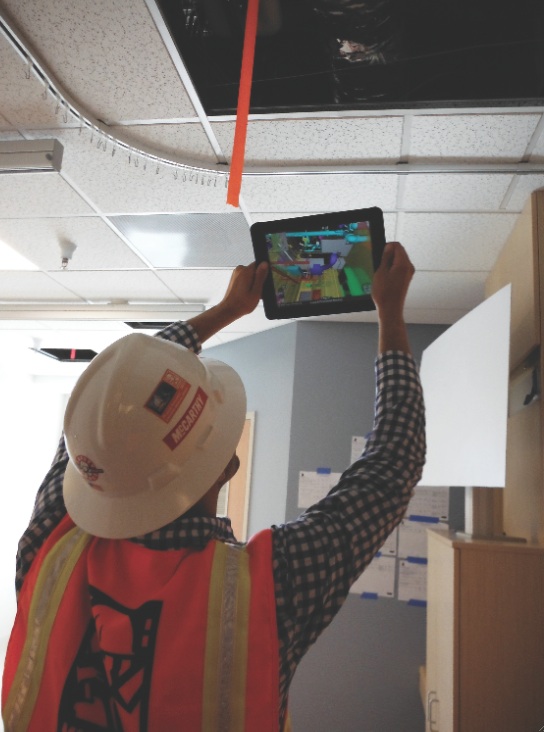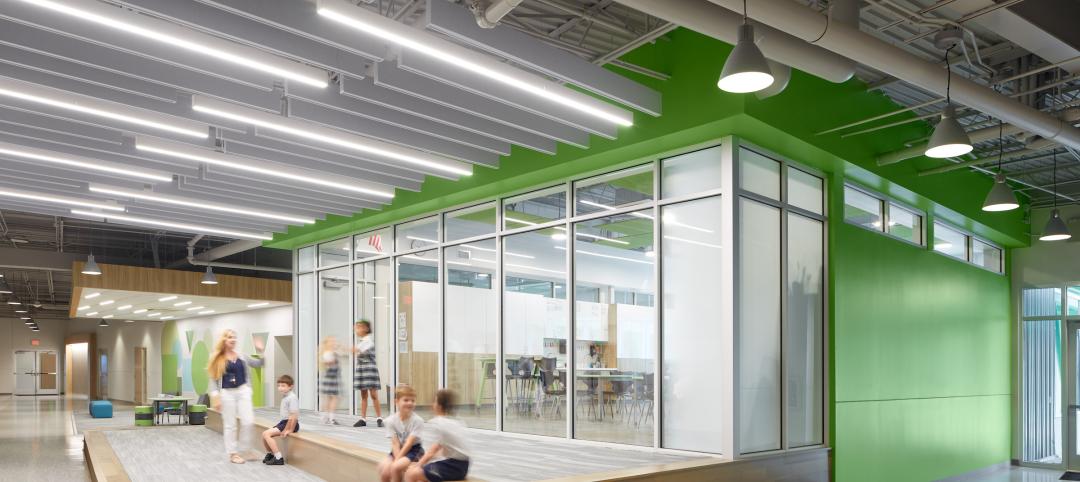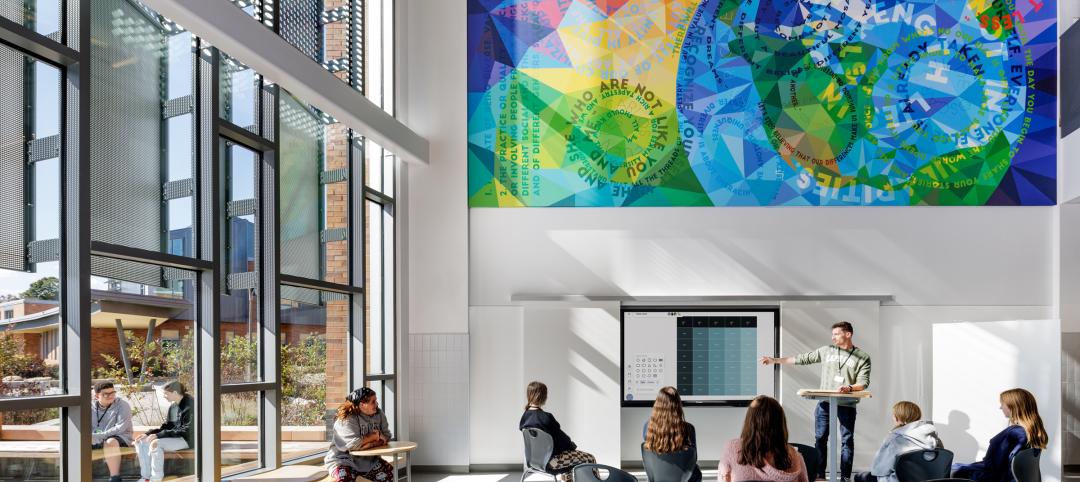Building Design+Construction reached out to AEC professionals who have studied and applied augmented reality and asked them to pinpoint applications that are ripe for the technology. Here’s what they had to offer:
1. Business development. Three-dimensional models are great for communicating your vision for a building project, but imagine the impact of being able to take potential clients on a walking virtual tour of a design scheme while on the site. For instance, some luxury condo developers are testing AR for use by their sales teams for virtual tours during the preconstruction and construction phases. And some high-end homebuilders are using the technology in their physical model homes to better demonstrate upgrade options.
2. Design visualization at all phases. Any time there’s data to be visualized, there’s a good case for AR, says Autodesk’s Dace Campbell, AIA, LEED AP. “Photo-matching is a common practice for many designers, using tools like Photoshop to show ‘what if’ scenarios overlaid in a real context,” he says. “AR supports the rapid study of design alternatives, with real-time photo-matching from any viewpoint, and at full scale.”
3. Survey and layout. “Whether you’re surveying the real world to gather data to put into a virtual model or are doing layout with survey tools, to me that’s a strong case for augmented reality,” says Campbell. “If we had accurate, dependable position tracking, arguably you wouldn’t need a tape measure. It would be the next generation of the total station, where the virtual projection shows you precisely where each component of the building gets installed. Except, unlike with a total station, layout is done intuitively and in real time.”
4. Design analysis. With AR, virtually any analysis a Building Team already does on screen—seismic analysis, acoustic performance, structural modeling, etc.—hypothetically can be performed in the physical space. “We can already do that with today’s CAD and BIM tools, but AR will enable us to perform analysis at full scale while walking around a project site,” says Campbell.
5. Design assistance and constructability review. Being able to perform constructability review in situ during construction with both the architect and contractor standing in the same space has tremendous potential for enhancing communication and confidence, as well as cost and time savings.
6. Scheduling and site logistics planning. AR can extend today’s 4D scheduling tools to the project site, enabling a real-time look at the actual progress of a construction project compared to the planned progress while team members are touring the construction site. It can also be used to help visualize phased site logistics on complex projects.
7. Prefabrication. “Some forward-thinking contractors are looking at AR to support prefabrication inside a shop,” says Campbell. An advantage to prefabrication is higher quality, since laborers are assembling components in a factory, away from inclement weather.
8. General fabrication installation. Firms can use AR to help guide a building component into place. Furthermore, AR can support the installation effort by augmenting the laborer’s view with specific assembly instructions, specifications, and relevant standards.
9. Quality control, punch lists, and inspections. Whether it’s a municipality official doing an inspection or a contractor checking construction, quality control is an easy entry point into AR for many firms. For example, an inspector can make sure all the sleeves are in the right location before they complete formwork for a shear wall. Being able to overlay the BIM model of what was intended versus what is actually in place could offer huge benefits for construction teams.
10. Safety. AR can enable teams to do spatial safety audits, making sure, for example, work isn’t taking place above or below other critical work. Also, hazardous work and critical emergency information could be highlighted in an AR view so that all workers are aware of on-site hazards and remedies. For instance, laborers doing hot work on a roof could be alerted to the location of the nearest fire extinguishers.
11. Commissioning. With AR, you can overlay metadata onto the assets in the facility and extend what has taken place during punch listing and inspections. Agents responsible for commissioning and testing can have relevant information about a building asset available to them in context, without having to search through reports and logs to find or enter a specific point of information.
12. Facility operations and maintenance. Campbell calls AR the “ultimate stud finder.” Provided that the BIM model is updated to offer an accurate representation of what was built, facilities professionals can use AR to look behind walls, above ceilings, and below floors without ever touching the space. A facility engineer could get a pretty good idea of where building systems reside without performing destructive demolition and surveying.
Read our full report on augmented reality for the AEC field.
Related Stories
Office Buildings | Nov 2, 2023
Amazon’s second headquarters completes its first buildings: a pair of 22-story towers
Amazon has completed construction of the first two buildings of its second headquarters, located in Arlington, Va. The all-electric structures, featuring low carbon concrete and mass timber, help further the company’s commitment to achieving net zero carbon emissions by 2040 and 100% renewable energy consumption by 2030. Designed by ZGF Architects, the two 22-story buildings are on track to become the largest LEED v4 Platinum buildings in the U.S.
Sustainability | Nov 1, 2023
Researchers create building air leakage detection system using a camera in real time
Researchers at the U.S. Department of Energy’s Oak Ridge National Laboratory have developed a system that uses a camera to detect air leakage from buildings in real time.
Adaptive Reuse | Nov 1, 2023
Biden Administration reveals plan to spur more office-to-residential conversions
The Biden Administration recently announced plans to encourage more office buildings to be converted to residential use. The plan includes using federal money to lend to developers for conversion projects and selling government property that is suitable for conversions.
Sustainability | Nov 1, 2023
Tool identifies financial incentives for decarbonizing heavy industry, transportation projects
Rocky Mountain Institute (RMI) has released a tool to identify financial incentives to help developers, industrial companies, and investors find financial incentives for heavy industry and transport projects.
Contractors | Nov 1, 2023
Nonresidential construction spending increases for the 16th straight month, in September 2023
National nonresidential construction spending increased 0.3% in September, according to an Associated Builders and Contractors analysis of data published today by the U.S. Census Bureau. On a seasonally adjusted annualized basis, nonresidential spending totaled $1.1 trillion.
Sponsored | MFPRO+ Course | Oct 30, 2023
For the Multifamily Sector, Product Innovations Boost Design and Construction Success
This course covers emerging trends in exterior design and products/systems selection in the low- and mid-rise market-rate and luxury multifamily rental market. Topics include facade design, cladding material trends, fenestration trends/innovations, indoor/outdoor connection, and rooftop spaces.
Office Buildings | Oct 30, 2023
Find Your 30: Creating a unique sense of place in the workplace while emphasizing brand identity
Finding Your 30 gives each office a sense of autonomy, and it allows for bigger and broader concepts that emphasize distinctive cultural, historic or other similar attributes.
Giants 400 | Oct 30, 2023
Top 170 K-12 School Architecture Firms for 2023
PBK Architects, Huckabee, DLR Group, VLK Architects, and Stantec top BD+C's ranking of the nation's largest K-12 school building architecture and architecture/engineering (AE) firms for 2023, as reported in Building Design+Construction's 2023 Giants 400 Report.
Giants 400 | Oct 30, 2023
Top 100 K-12 School Construction Firms for 2023
CORE Construction, Gilbane, Balfour Beatty, Skanska USA, and Adolfson & Peterson top BD+C's ranking of the nation's largest K-12 school building contractors and construction management (CM) firms for 2023, as reported in Building Design+Construction's 2023 Giants 400 Report.
Giants 400 | Oct 30, 2023
Top 80 K-12 School Engineering Firms for 2023
AECOM, CMTA, Jacobs, WSP, and IMEG head BD+C's ranking of the nation's largest K-12 school building engineering and engineering/architecture (EA) firms for 2023, as reported in Building Design+Construction's 2023 Giants 400 Report.

















